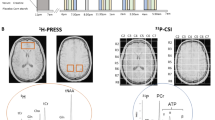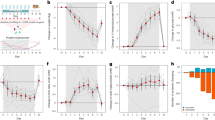Abstract
Background:
Consumption of snacks might contribute to the obesity epidemic. It is not clear how the moment of consumption and energy density of snacks can influence the compensatory response to consumption of snacks in the long term.
Objective:
To investigate the effects of snack consumption for 8 weeks on changes in body weight, emphasizing on moment of consumption and energy density.
Design:
In total, 16 men and 66 women (mean age 21.9 years (s.d. 0.3 year), mean body mass index 20.7 kg m−2 (s.d. 0.2 kg m−2)) were randomly assigned to one of four parallel groups in a 2 × 2 design: snacks consumed with or between meals and snacks having a low (<4 kJ g−1) or high (>12 kJ g−1) energy density. For 8 weeks, subjects consumed mandatory snacks that provided 25% of energy requirements on each day. Body weight, body composition, physical activity level (PAL) and energy intake were measured in week 1 and week 8.
Results:
There were no differences in changes in body weight between the four groups. Moment of consumption (P=0.7), energy density (P=0.8) and interaction (P=0.09) did not influence body weight. Similarly, there were no differences in changes in body composition, PAL and energy intake between the four groups.
Conclusions:
Body weight after 8 weeks of snack consumption was not affected by moment of consumption and energy density of snacks. This finding suggests that consuming snacks that are high or low in energy density does not necessarily contribute to weight gain. Healthy, nonobese young adults may be able to maintain a normal body weight through an accurate compensation for the consumption of snacks.
This is a preview of subscription content, access via your institution
Access options
Subscribe to this journal
Receive 12 print issues and online access
$259.00 per year
only $21.58 per issue
Buy this article
- Purchase on Springer Link
- Instant access to full article PDF
Prices may be subject to local taxes which are calculated during checkout



Similar content being viewed by others
References
Mazlan N, Horgan G, Whybrow S, Stubbs J . Effects of increasing increments of fat- and sugar-rich snacks in the diet on energy and macronutrient intake in lean and overweight men. Br J Nutr 2006; 96: 596–606.
Whybrow S, Mayer C, Kirk TR, Mazlan N, Stubbs RJ . Effects of two weeks’ mandatory snack consumption on energy intake and energy balance. Obesity (Silver Spring) 2007; 15: 673–685.
Marmonier C, Chapelot D, Fantino M, Louis-Sylvestre J . Snacks consumed in a nonhungry state have poor satiating efficiency: influence of snack composition on substrate utilization and hunger. Am J Clin Nutr 2002; 76: 518–528.
Marmonier C, Chapelot D, Louis-Sylvestre J . Effects of macronutrient content and energy density of snacks consumed in a satiety state on the onset of the next meal. Appetite 2000; 34: 161–168.
Yates H, Crombie N, Kirk T . Energy intake compensation during snacking intervention—a pilot study. Nutr Food Sci 1998; 5: 267–271.
Rolls BJ, Roe LS, Kral TV, Meengs JS, Wall DE . Increasing the portion size of a packaged snack increases energy intake in men and women. Appetite 2004; 42: 63–69.
Bellisle F, McDevitt R, Prentice AM . Meal frequency and energy balance. Br J Nutr 1997; 77 (Suppl 1): S57–S70.
Berteus Forslund H, Torgerson JS, Sjostrom L, Lindroos AK . Snacking frequency in relation to energy intake and food choices in obese men and women compared to a reference population. Int J Obes (Lond) 2005; 29: 711–719.
Phillips SM, Bandini LG, Naumova EN, Cyr H, Colclough S, Dietz WH et al. Energy-dense snack food intake in adolescence: longitudinal relationship to weight and fatness. Obes Res 2004; 12: 461–472.
Howarth NC, Huang TT, Roberts SB, Lin BH, McCrory MA . Eating patterns and dietary composition in relation to BMI in younger and older adults. Int J Obes (Lond) 2007; 31: 675–684.
Berteus Forslund H, Klingstrom S, Hagberg H, Londahl M, Torgerson JS, Lindroos AK . Should snacks be recommended in obesity treatment? A 1-year randomized clinical trial. Eur J Clin Nutr 2008; 62: 1308–1317.
de Graaf C . Effects of snacks on energy intake: an evolutionary perspective. Appetite 2006; 47: 18–23.
Rolls BJ, Kim S, McNelis AL, Fischman MW, Foltin RW, Moran TH . Time course of effects of preloads high in fat or carbohydrate on food intake and hunger ratings in humans. Am J Physiol 1991; 260: R756–R763.
Hulshof T . Fat and Non-Absorbable Fat and the Regulation of Food Intake. PhD thesis, Wageningen University, Wageningen, 1994.
Booth DA . Mechanisms from models—actual effects from real life: the zero-calorie drink-break option. Appetite 1988; 11 (Suppl 1): 94–102.
Rolls BJ, Roe LS, Meengs JS . Salad and satiety: energy density and portion size of a first-course salad affect energy intake at lunch. J Am Diet Assoc 2004; 104: 1570–1576.
Rolls BJ, Roe LS, Meengs JS . Reductions in portion size and energy density of foods are additive and lead to sustained decreases in energy intake. Am J Clin Nutr 2006; 83: 11–17.
Mazlan N, Horgan G, Stubbs RJ . Energy density and weight of food effect short-term caloric compensation in men. Physiol Behav 2006; 87: 679–686.
Kral TV, Roe LS, Rolls BJ . Combined effects of energy density and portion size on energy intake in women. Am J Clin Nutr 2004; 79: 962–968.
Strien Tv . Eating Behaviour Personality Traits and Body Mass. Landbouw Hogeschool: Wageningen, 1986.
WHO. Principles for the estimation of energy requirements. Energy and protein requirements. Report of a joint FAO/WHO/UNU expert consultation. 2nd edition Geneva. World Health Organization 1985; 1985: 34–52.
Fields DA, Goran MI, McCrory MA . Body-composition assessment via air-displacement plethysmography in adults and children: a review. Am J Clin Nutr 2002; 75: 453–467.
Dutch Food Composition Table. NEVO tabel SNSV.
Westerterp KR . Assessment of physical activity: a critical appraisal. Eur J Appl Physiol 2009; 105: 823–828.
Verboeket-van de Venne WP, Westerterp KR, Kester AD . Effect of the pattern of food intake on human energy metabolism. Br J Nutr 1993; 70: 103–115.
Smeets AJ, Westerterp-Plantenga MS . Acute effects on metabolism and appetite profile of one meal difference in the lower range of meal frequency. Br J Nutr 2008; 99: 1316–1321.
Kral TV, Rolls BJ . Energy density and portion size: their independent and combined effects on energy intake. Physiol Behav 2004; 82: 131–138.
Bes-Rastrollo M, van Dam RM, Martinez-Gonzalez MA, Li TY, Sampson LL, Hu FB . Prospective study of dietary energy density and weight gain in women. Am J Clin Nutr 2008; 88: 769–777.
Savage JS, Marini M, Birch LL . Dietary energy density predicts women's weight change over 6 y. Am J Clin Nutr 2008; 88: 677–684.
Ello-Martin JA, Roe LS, Ledikwe JH, Beach AM, Rolls BJ . Dietary energy density in the treatment of obesity: a year-long trial comparing 2 weight-loss diets. Am J Clin Nutr 2007; 85: 1465–1477.
Rolls BJ, Roe LS, Beach AM, Kris-Etherton PM . Provision of foods differing in energy density affects long-term weight loss. Obes Res 2005; 13: 1052–1060.
Stubbs RJ, Whybrow S . Energy density, diet composition and palatability: influences on overall food energy intake in humans. Physiol Behav 2004; 81: 755–764.
Provencher V, Polivy J, Herman CP . Perceived healthiness of food. If it's healthy, you can eat more!. Appetite 2009; 52: 340–344.
Johnstone AM, Shannon E, Whybrow S, Reid CA, Stubbs RJ . Altering the temporal distribution of energy intake with isoenergetically dense foods given as snacks does not affect total daily energy intake in normal-weight men. Br J Nutr 2000; 83: 7–14.
Westerterp-Plantenga MS, Wijckmans-Duysens NA, ten Hoor F . Food intake in the daily environment after energy-reduced lunch, related to habitual meal frequency. Appetite 1994; 22: 173–182.
Forbes GB, Brown MR, Welle SL, Lipinski BA . Deliberate overfeeding in women and men: energy cost and composition of the weight gain. Br J Nutr 1986; 56: 1–9.
Acknowledgements
The contributions of the authors were as follows: MVvD: design of the study, data collection, data analyses, interpretation of data, writing of the paper; FJK: consultation and revision of the paper; CdG: design of the study, interpretation of data, revision of the paper. The study was financially supported by the Dutch Nutrition Center, The Hague, The Netherlands.
Author information
Authors and Affiliations
Corresponding author
Rights and permissions
About this article
Cite this article
Viskaal - van Dongen, M., Kok, F. & de Graaf, C. Effects of snack consumption for 8 weeks on energy intake and body weight. Int J Obes 34, 319–326 (2010). https://doi.org/10.1038/ijo.2009.243
Received:
Revised:
Accepted:
Published:
Issue Date:
DOI: https://doi.org/10.1038/ijo.2009.243
Keywords
This article is cited by
-
Effect of monosodium glutamate on fetal development and progesterone level in pregnant Wistar Albino rats
Environmental Science and Pollution Research (2023)
-
Position statement on nutrition therapy for overweight and obesity: nutrition department of the Brazilian association for the study of obesity and metabolic syndrome (ABESO—2022)
Diabetology & Metabolic Syndrome (2023)
-
Trajectories of eating behaviors in a nationally representative cohort of U.S. adolescents during the transition to young adulthood
International Journal of Behavioral Nutrition and Physical Activity (2015)
-
Eating frequency, energy intake and body weight during a successful weight loss trial in overweight and obese postpartum women
European Journal of Clinical Nutrition (2014)
-
Differences in lifestyle behaviors, dietary habits, and familial factors among normal-weight, overweight, and obese Chinese children and adolescents
International Journal of Behavioral Nutrition and Physical Activity (2012)



